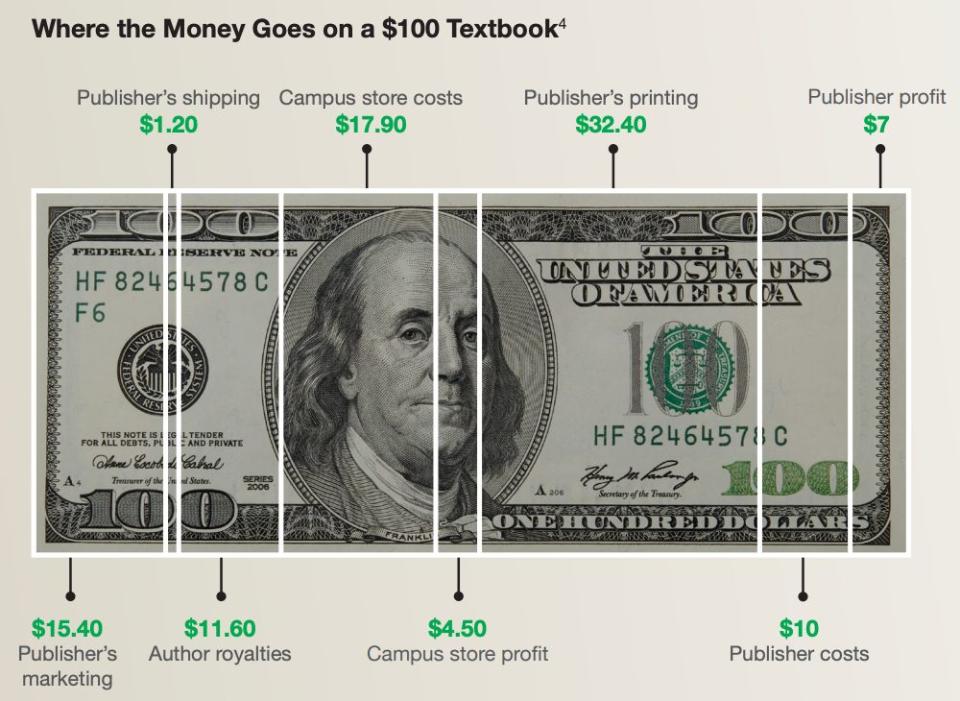'The textbook market is broken' and the latest mega-merger makes it worse
This post has been updated.
Big Textbook is consolidating.
With a handful of companies controlling the market, the newly announced merger between McGraw-Hill and Cengage — two of the world’s biggest textbook makers — worsens an already “broken textbook marketplace,” according to experts. The merged company would be named McGraw Hill, book about $3.16 billion in annual revenue, and be valued at about $5 billion.
The proposed merger —which combined would boast 44,000 textbook titles in print and online, as well as a subscription program — is “consolidating power into fewer companies and it reinforces the problem,” Kaitlyn Vitez, higher education campaign director at PIRG, told Yahoo Finance.
“Unless they significantly change their marketing strategies and their products in this merger … the same broken textbook marketplace is in place,” she added.
And the implications in the long term are worrying, SPARC Director of Open Education Nicole Allen told Yahoo Finance.
“The future of textbook publishing isn't about content, it's about data and analytics,” Allen said. The larger the company you are, the larger the data empire you can amass, and the more services you can build and sell back to institutions.”
In a statement to Yahoo Finance, Cengage said that “we’re strengthening our commitment to providing affordable solutions for students with this merger. Combining our businesses will enable us to invest more in models that lower costs for students and improve learning.”

‘The textbook market is broken’
An average student spends $484 on required course materials, according to the National Association of College Stores. And while that cost is significantly down from 2007 — when a student would spend $701 on textbooks and materials — other expenses have popped up and those dollars definitely add up.
“The professors are assigning materials and the students have to buy it,” Vitez said. “That leaves the publisher to raise prices as much as they want. They’ll create custom editions for classes that are difficult to re-sell.”
And the price of textbooks has firmly remained high while the cost of recreational books has held steady over the same time period.
“The cost of textbooks has risen four times faster than inflation,” Vitez noted. “That’s because the textbook market is broken.”

For years, reports have examined how the textbook industry is largely controlled by Cengage, McGraw-Hill, Houghton Mifflin, and Pearson Education, big companies that are able to dominate the market with their deep expertise in educational materials and relationships with universities.
“The economic structure of the prescription drug market and the textbook market are very similar,” SPARC’s Allen explained. “In both cases the person who is an expert … [and they] create this dynamic that gives the publisher or pharmaceutical company to charge really high prices … Their goal is to generate profit.”
In 2020, the domestic educational services market is expected to reach $2 trillion according to GSV Advisors.
And with few players getting a slice of the pie, Houghton Mifflin Harcourt Company, for example, which is one of the industry titans, made $1.12 billion in net sales from educational materials last year.

‘The textbook market holds students captive‘
Students, meanwhile, are feeling the squeeze.
“Most of the times I’ve had to buy things that are in core classes,” UPenn student Kenan Saleh, who also wrote an op-ed against e-textbooks in his school paper, told Yahoo Finance. “They make it part of your grade to answer the questions that they have. The online ones are particularly egregious. I never understood those.”
Vitez also pointed out that assignments and quizzes are increasingly hidden behind an academic version of paywalls that require an up-to-date subscription to a textbook.
In other words, students pay for a service to get access to a) read the textbook, b) complete assignments, and c) take exams.
Most times, the access codes expire after the semester ends, meaning that students lose access to those valuable materials after a short period of time.
“The textbook market holds students captive because they have to buy materials they’re assigned,” Allen said. “Students are in a really captive position and can be frustrating. We have worked for many years encouraging students to reach out to their professors … at least provide some information about where to book for more affordable materials.”

Disrupting from within
Publishers aren’t oblivious to the problem. In an interview with Yahoo Finance prior to the proposed merger, Cengage said that it was trying its best to look for creative solutions to this problem of unaffordability.
“What brought me to Cengage some six and a half years ago was essentially the challenge of really taking a very traditional company and very traditional publishing business model into as it were the 21st century and making that transition to digital,” Cengage Learning CEO Michael Hansen said.
“The student user experience was still deeply stuck in the 20th century,” added Hansen, who is likely to head the new McGraw Hill entity. “The vast majority of students today in K-12 or higher-ed essentially learned from traditional press packs textbooks very little digital enablement.”
Hence, offering a digital model that can customize the learning experience would be “extremely powerful,” he said, adding that it is “pathetic that it happens is so few of the student experiences in the United States and for that matter around the world today.”
In terms of addressing the problem of affordability, the company came up with a subscription service called Cengage Unlimited.
“You should be consuming educational materials like you consume movies today,” Hansen said, “which [means] basically with a monthly subscription, you get everything you need there is no more hidden costs.
The initiative has been a success, Hansen added, adding that 1 million students signed up in less than 7 months.

Professors like Clifford Wright at the Xavier University of Louisiana attested to that fact.
“We started using them last fall, and Cengage came to us,” Wright said in an interview. “We’re satisfied with the books, but I’ve been very much concerned increase in the cost of the books. … So [when] Cengage came and offered a package for 1 book for $119 and all the other books for free, we jumped on it last fall.”
Students could take 4 classes and only pay $119 for the materials, and “all they’re getting with the new Cengage program… is they’re getting a book online at a very reduced price,” he added.
Asked about Cengage’s product, Vitez worried that there was no guarantee that the price would remain the same.
“They advertise their product as a Netflix-style product,” she said. “You and I and the rest of America know that that price goes up. … They need to show that things like access codes are going to actually be a better deal for students.”
Hansen said the company wants to keep the textbook prices low because educational materials “should be affordable and it should be customized to your needs. And I think we can get there within the next five years.”
‘The problem isn’t digital’
PIRG’s Vitez remains unconvinced.
“The problem isn’t digital,” she stressed. “The problem is that closed expiring access to materials. When we think about these short-term access codes, or short-term online rental e-textbooks, students can’t retain them or resell them and make their money back.”
Vitez added that the courses that are most likely to require expensive textbooks and access codes are in introductory classes “that have a lot of homework assignments where professors are looking for easy grading solutions.”

Another layer of the problem that’s affecting a lot of students is the deal publishers have with institutions that auto-charge student for textbooks, according to both Allen and Vitez.
So in some cases, students signing up for a degree may automatically be charged the price of the textbook prior to even taking the course because of an existing arrangement between the publisher and the school.
It happened last fall — South Carolina’s largest public technical college was found to have added an automatic fee into students’ tuition bills for limited-time access to e-textbooks from Pearson. They pitched it as “inclusive access,” designed to help save students money.
“The publishers aren’t stupid,” Jeremy Cucinella, regional manager of Virginia Pirate Corp., which owns Textbook Brokers in North Charleston, told the local paper. The publishers “targeted these community colleges where you have student populations that aren’t going to be as affluent as at four-year schools. ... The program is extremely confusing and causes people to get frustrated.”
Vitez added that it is becoming a more common trend, and that “publishers will approach schools and will just sign one deal. … That’s all well and good if they’re actually providing materials to students below market rate,” she added. “But we shouldn’t be pushing students towards access codes.”
Aarthi is a writer for Yahoo Finance. Follow her on Twitter @aarthiswami.
Read more:
Student loan expert: 'This administration does not care about students'
Elizabeth Warren torches consumer protection head for not protecting consumers
Follow Yahoo Finance on Twitter, Facebook, Instagram, Flipboard, LinkedIn, YouTube, and reddit.

